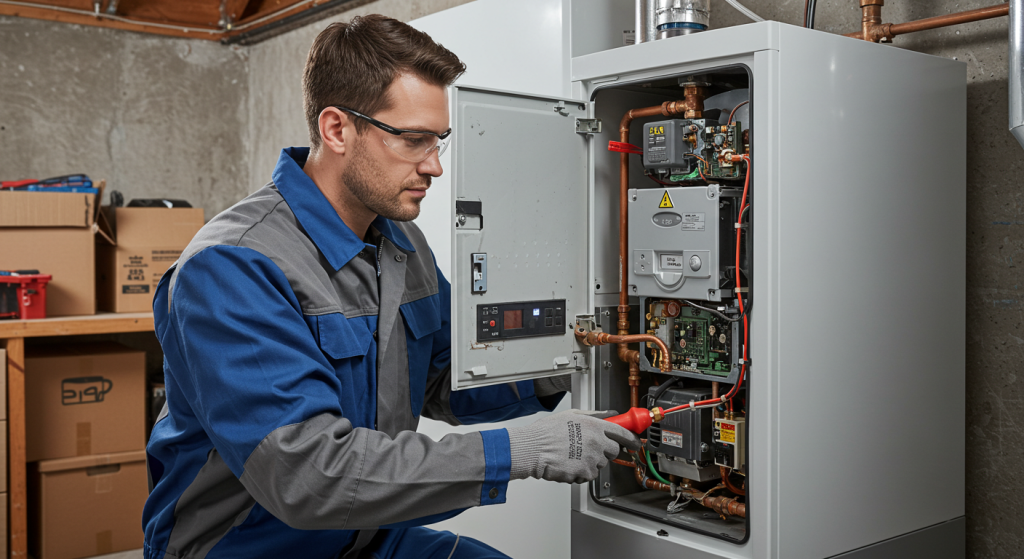Is your electric water boiler acting up? At Obie Comfort Solutions, we understand the inconvenience and are here to help you diagnose and fix common issues like no heat, low water pressure, and strange noises. Learn practical steps for addressing these problems to get your boiler running smoothly again, ensuring safety and proper care.

Key Takeaways
- Common issues with electric water boilers include heating problems, low water pressure, and electrical faults. Basic troubleshooting can often fix these issues.
- Regular maintenance, such as annual servicing and simple tasks like bleeding radiators, is essential to keep your boiler running efficiently and prevent costly repairs.
- For complex issues like leaks, ignition problems, or major repairs, contacting a qualified professional is critical to ensure safety and proper functionality.
Electric Water Boiler Not Heating Up
Few things are as frustrating as turning on your boiler only to find that it’s not heating up at all. This issue can stem from causes like power loss or a malfunctioning heating element. Common culprits include faulty heating elements, thermostat issues, diverter valve problems, and low boiler pressure.
Troubleshooting Basics
Before you rush to call a professional, check your boiler’s pressure gauge. Low pressure can impede heating, and adjusting it might resolve the issue. Also, review thermostat settings; sometimes, a minor adjustment is all that’s needed. If these checks don’t solve the issue, consult a professional to safely diagnose and repair more complex problems.
Low Water Pressure in Electric Boilers
Low water pressure can significantly affect your boiler’s performance, causing inefficient heating. This often results from system leaks, failed joints, or component corrosion. If the pressure gauge reads below one, the issue requires attention.
Steps to Address Low Water Pressure
- Identify Leaks: Look for visible leaks around joints or pipes. If none are apparent, a professional inspection is necessary for hidden leaks.
- Repressurize Safely: Follow your manufacturer’s instructions to repressurize the boiler, taking care to avoid over-pressurizing.
- Consult a Professional: If pressure issues persist, call a heating engineer to check for deeper system problems.
Electric Boiler Making Unusual Noises
Unusual noises like gurgling, whistling, or banging often indicate underlying issues. These may include trapped air, overheating water, or sediment build-up. Addressing these noises promptly can prevent further damage.
Safe Solutions for Common Noises
- Air in the System: Bleed radiators to release trapped air. Be sure to check the pressure gauge afterward and adjust if necessary.
- Sediment Build-Up: For significant sediment accumulation, contact a professional for a power flush or chemical cleaning. This is a safe and effective way to restore optimal operation.
Boiler Keeps Tripping the Circuit Breaker
If your boiler keeps tripping the circuit breaker, it may indicate an electrical fault or overload. Causes include damaged wiring or overloaded circuits.
Best Practices for Electrical Issues
Inspecting internal and external wiring should always be done by a qualified professional to ensure safety. Additionally, connecting your boiler to a dedicated electrical circuit can reduce the risk of frequent trips.
Water Leaking from the Boiler
Leaks can result from issues like a faulty pressure relief valve, corrosion, or loose joints. High pressure may also cause leaks. Addressing these promptly is crucial to avoid damage.
Professional Repair for Leaks
- Faulty Seals and Valves: Rubber seals can degrade over time, causing leaks. A trained heating engineer should replace damaged seals to ensure proper functionality.
- Corrosion Management: Corrosion in older boilers may lead to cracks or leaks. Regular inspections by a professional can detect and address corrosion early.
Boiler Not Responding to Controls
If your boiler isn’t responding, it might be due to a faulty thermostat or control panel issues. Start with simple checks, like ensuring the boiler is powered on and batteries are functional.
When to Call for Help
If resetting the system doesn’t restore functionality.
Summary
Maintaining your electric boiler and addressing common issues promptly can ensure efficient and safe operation. Regular servicing, proper maintenance, and knowing when to seek professional help are key to extending the life of your boiler and keeping your home warm and comfortable.
Frequently Asked Questions
What are common reasons for an electric boiler not heating up?
Power loss, faulty heating elements, thermostat problems, or low pressure are common culprits. Check these factors first.
How can I identify leaks causing low water pressure?
Check for visible leaks and monitor pressure levels. For hidden leaks, consult a professional.
What should I do if my boiler keeps tripping the circuit breaker?
Ensure the boiler is on a dedicated circuit and inspect wiring. Call a professional if the issue persists.
How often should I service my electric boiler?
Service your boiler annually to maintain safety and efficiency.
When should I call a professional for boiler repairs?
For major repairs, safety concerns, or if DIY fixes fail, always contact a qualified professional.
